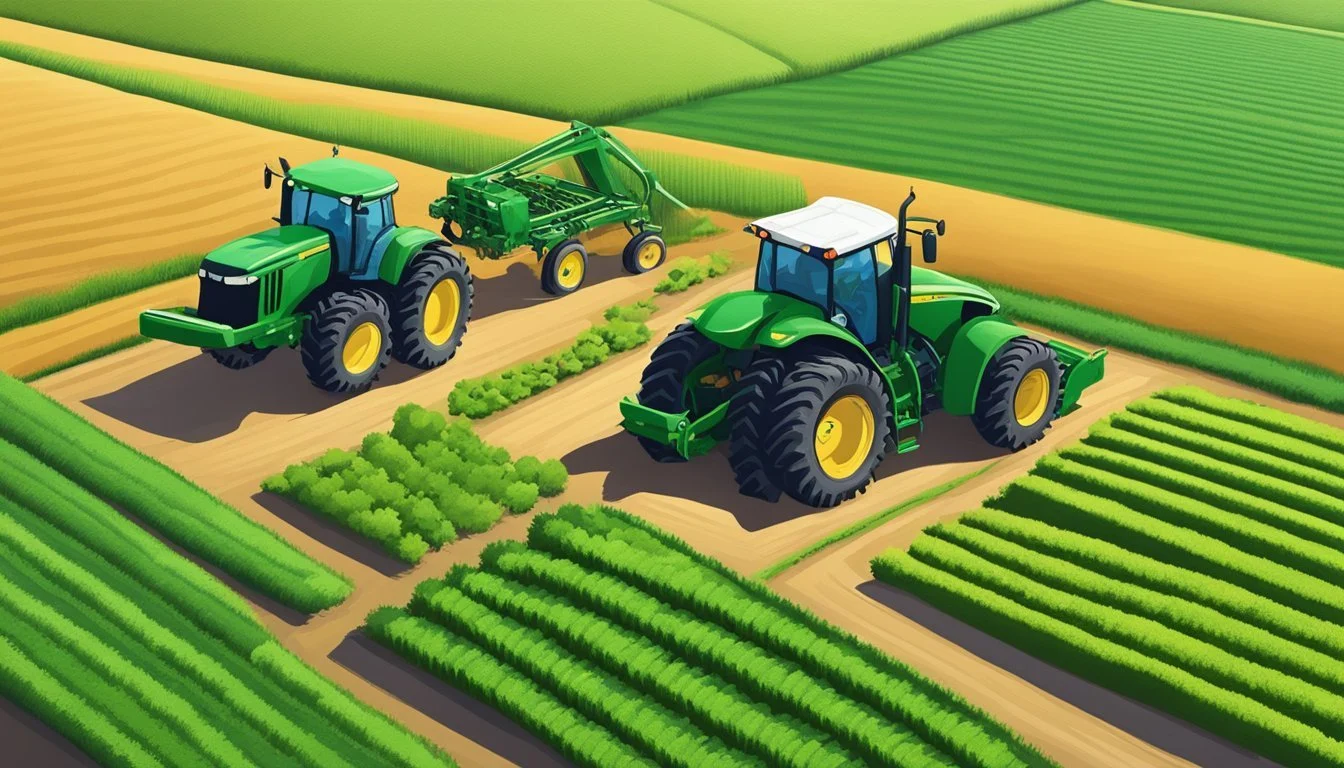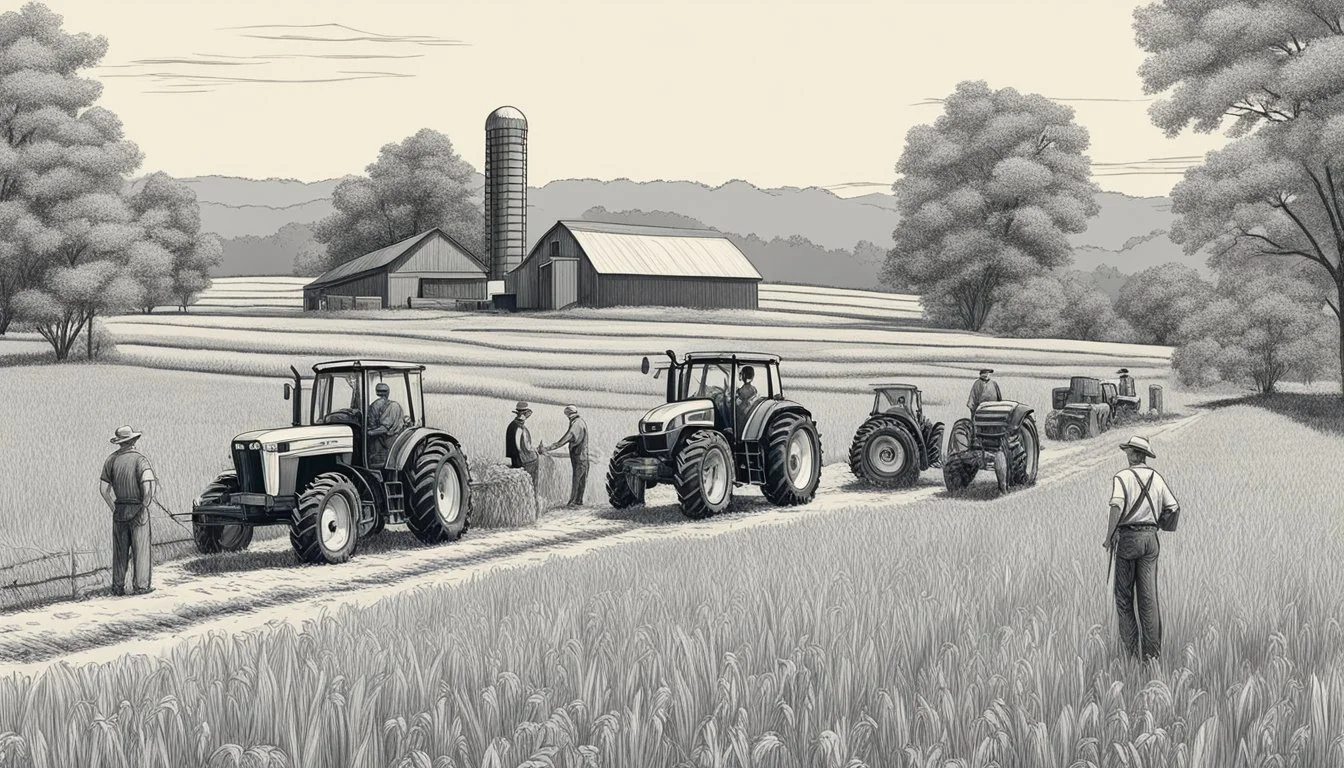Farming Grants Missouri
Navigating Opportunities for Agricultural Funding
Missouri's landscape and economy are deeply rooted in agriculture, making it a prime state for agricultural innovation and expansion. To support this vital industry, a variety of farming grants are available to Missouri producers. These grants aim to provide financial assistance to farmers, agribusinesses, and related entities as a means to stimulate growth, implement sustainable practices, and enhance the overall productivity of the agricultural sector within the state.
The Missouri Department of Agriculture plays a crucial role in promoting and supporting farming operations through financial programs that include grants, loans, loan guarantees, and tax credits. These offerings are tailored to diverse agricultural activities ranging from production agriculture, specialty crops, and organic certification, to biofuels, food insecurity, urban agriculture, and value-added agriculture. They serve not only established producers but also cater to the unique needs of new and beginning farmers.
Recognizing that agriculture's challenges require a multifaceted approach, partnerships with organizations such as the USDA's Natural Resources Conservation Service also provide Missouri farmers with additional opportunities. These initiatives aim to conserve natural resources while enhancing the economic viability of agriculture. With these resources, Missouri farmers can access the necessary capital and technical assistance to innovate, compete, and thrive in a demanding market.
Overview of Farming Grants in Missouri
Missouri offers a variety of grants aimed at bolstering the agricultural sector, providing financial assistance to encourage innovation, value addition, and economic development in farming. These grants are critical in supporting Missouri's agricultural industry, which includes over 95,000 farms covering a significant portion of the state's land.
Understanding the Basics
Grants in Missouri are designed to provide farmers and agribusinesses with financial support that facilitates growth and sustainability. The Missouri Department of Agriculture (MDA) is a key entity in this process, offering resources and guidance to potential grant applicants. Funding can cover various needs including equipment, materials, marketing, and education.
Missouri Value-Added Agriculture Grant Program
The Missouri Value-Added Agriculture Grant Program is a prime example of state support for agricultural businesses. Its aim is to foster projects that enhance Missouri agricultural products and boost the rural economy. Aspects funded can include:
Business planning
Equipment and materials
Marketing strategies
Grants can reimburse up to 75% of approved project costs, with a maximum support amount of $10,000 per project.
Show-Me Entrepreneurial Grants for Agriculture
The Show-Me State offers Show-Me Entrepreneurial Grants for innovative farming ventures. These grants come forth to:
Encourage entrepreneurial initiatives
Promote agricultural production and value-added activities
Focus on workforce development in agriculture
Designed to boost agricultural economic development, these grants require clear business concepts and proofs of their potential impact on Missouri's agriculture.
Eligibility and Application Process
The application process for farming grants in Missouri requires careful adherence to eligibility guidelines and a structured proposal submission. Potential applicants must navigate these stages with precision to secure necessary funds for agricultural projects.
Qualifying for Grants
To qualify for farming grants in Missouri, applicants need to meet certain criteria established by the Missouri Department of Agriculture (MDA). Here's an outline detailing the standard requirements:
Farmers: Must be engaged in agricultural production within the state of Missouri.
Beginning Farmers: Special provisions often exist for individuals who are new to the agricultural industry. These provisions may include relaxed guidelines or additional supports.
Legal Assistance: Can be sought to assist with understanding grant stipulations and fulfilling legal requirements during the application.
Eligibility specifics vary per grant program and are subject to change, hence frequent consultation of the MDA's official documentation is advisable.
Navigating the Application
The application process for farming grants can be intricate, and meticulous attention to detail is crucial for a successful proposal. Here are key steps applicants typically follow:
Research: Carefully read all available materials on the MDA website to understand the scope and objectives of available grants.
Guidelines: Thoroughly examine the latest application guidelines for the particular grant of interest.
Proposal: Develop a proposal that concisely articulates the farming project, including objectives, methods, and anticipated outcomes.
Submission: Submit the proposal via the recommended channel—often an online application platform or a direct mailing to a specified address.
Deadlines are stringent, and late applications are generally not considered; therefore, timely submission is essential.
Types of Farming Grants
Missouri offers diverse farming grants to support agricultural producers, focusing on value-added agriculture, business development, and innovation. These grants are designed to encourage new technologies and uses for agricultural products, expanding Missouri's agribusiness landscape.
Value-Added Agriculture
Missouri's Value-Added Agriculture Grant Program supports projects that enhance the value of agricultural products. Qualifying projects must demonstrate an economic benefit to the rural community and a sound business concept. Grants can assist with development for:
New product creation
Marketing and branding strategy
Technological advancements in processing
Examples:
Infrastructure: Building facilities for processing agricultural goods
Marketing: Developing promotional materials for a new product
Agribusiness Development Grants
Grants under the Agribusiness Development category fuel growth within the state's agriculture industry. They support businesses that process Missouri's agricultural products and contribute to the economic development of local communities. Eligible projects range from the expansion of current operations to the creation of entirely new agribusiness ventures.
Focus areas include:
Business expansion for increased production
Technology adoption for efficiency
Research and Innovation Funding
Farming grants for Research and Innovation target the development of cutting-edge agricultural technologies and the discovery of new uses for Missouri's agricultural products. These grants fund initiatives that strive for innovation in agriculture, encouraging sustainable practices and boosting the sector's competitiveness.
Initiatives may involve:
Research on improving crop yields
Development of sustainable agricultural practices
Grant Utilization and Project Planning
Successful grant utilization in Missouri hinges on meticulous business planning and the strategic use of funding. Grants are often earmarked for specific agricultural advancements, requiring farmers to thoroughly prepare and execute plans.
Business Planning and Strategy
A comprehensive business plan is the foundation of any successful grant application. This document should detail the operational roadmap, including goals, growth opportunities, and business expansion strategies. Missouri's grant programs look favorably upon applications that exhibit a clear objective and a robust strategy for achieving it. A business plan typically includes:
Executive Summary: An overview of the agricultural business and its objectives.
Market Analysis: Insight into the market demand, including an evaluation of customer needs and competitive analysis.
Organizational Structure: Description of the business's operational framework and management hierarchy.
Operational Plan: A detailed account of day-to-day operations, resources needed, and logistical considerations.
Financial Plan: Projection of financial performance, existing resources, and additional funding requirements.
Matching Funds and Project Execution
Missouri grant programs often require matching funds from the applicant, signifying their investment in the project. The match can range from a small to a significant percentage of the total project cost, necessitating that applicants have some capital on hand or a strategy for securing the necessary funds.
Grant money can cover a wide array of project costs, including, but not limited to:
Equipment purchase
Marketing and advertising efforts
Operational consulting services
Business expansion activities
Workforce development and training
Following grant approval, it is imperative that recipients manage the funds with accuracy and integrity. Clear record-keeping and adherence to the agreed-upon plan are vital for successful project execution and future funding opportunities. Moreover, successfully executed projects may lead to benefits such as tax credits and other incentives that can offset operational costs.
Additional Support and Resources
Missouri offers diverse programs to support its agricultural industry, focusing on aspects such as technical guidance, marketing aid, and educational initiatives to bolster farming operations.
Technical and Educational Assistance
Farmers seeking to advance their agricultural practices or gain further knowledge can access various state-sponsored programs. Technical assistance encompasses on-farm consultations and access to the latest agricultural research. Educational support takes the form of workshops, online resources, and field days, all aimed at enhancing farmer expertise and productivity.
Educational Platforms: Workshops, webinars, field days
Technical Support Areas: Sustainable farming techniques, soil health, water conservation
Marketing and Commercialization Support
To assist with the marketing and commercialization of agricultural products, Missouri provides multiple resources. This includes support for processing and marketing studies, aiding producers in identifying new markets and optimizing commercial strategies. Grants and loans aid in the development of marketing materials and campaigns, and the loan guarantee program helps mitigate the financial risk of expanding commercial operations.
Marketing Assistance:
Grants for market development
Aid in creating marketing materials
Commercialization Resources:
Support for processing initiatives
Loan guarantees for market expansion
Success Stories and Case Studies
Missouri's commitment to agricultural economic development has yielded significant success stories, particularly through initiatives that strengthen the synergy between farmers and local markets, and by fostering innovation within the agricultural sector.
Missouri's Farm to Table Initiatives
The University of Missouri has played a pivotal role in advancing farm to table initiatives. With the largest-ever federal research, education, and extension grant, they have focused on adapting farming practices to climate change. These efforts have aimed to scale regenerative practices and ensure that small and underserved farmers are included in the conversation. This demonstrates substantial progress in bringing locally grown agricultural products directly to Missouri's tables, bolstering the state's commitment to sustainable food systems.
Innovation in Agriculture
Innovation also thrives within Missouri's agricultural landscape. Kansas State University's grant programs, directed by Joe Parcell, exemplify how educational institutions can support agricultural businesses. These grants enable farmers to explore value-added agricultural business opportunities, enhancing the state's economic development. Moreover, this financial support aids farmers in demonstrating new and efficient practices that contribute to the evolution of the agriculture industry.
Entities such as the Missouri Agricultural and Small Business Development Authority (MASBDA) further contribute to these success stories by focusing on the growth of agricultural products and businesses in the state. Collectively, these case studies reflect Missouri's robust and strategic approach to supporting its farmers and local economies.
State and Federal Agriculture Programs
Missouri's agriculture sector benefits from various state and federal programs designed to support farmers and agribusinesses. These initiatives provide critical funding and resources aimed at promoting agricultural economic development and strengthening rural communities.
Missouri Department of Agriculture Programs
The Missouri Department of Agriculture (MDA) offers financial aid through programs that cater to different aspects of the agricultural industry.
Agribusiness Development: MDA supports agribusiness through diversification and market expansion opportunities, including Value-Added Agriculture and Specialty Crops.
Infrastructure: Assistance is provided to revamp essential infrastructure, thereby fostering the growth of Missouri's agribusiness.
Higher Education Institutions and Cooperatives: MDA collaborates with educational and cooperative organizations to bolster research, education, and extension services.
Biofuels and Organic Certification: Programs exist to encourage the production of biofuels and assist farms in obtaining organic certification.
U.S. Department of Agriculture Partnerships
The U.S. Department of Agriculture (USDA) maintains partnerships that extend to the state level and offer crucial support to farmers in Missouri.
Federal Programs: USDA's suite of federal programs are accessible, including loans, grants, and technical assistance via agencies such as the Natural Resources Conservation Service (NRCS).
Regional Conservation Partnership Program (RCPP): Through RCPP, farmers can receive assistance for conservation efforts, a partnership initiative that includes federal support combined with local resources.
Rural Community Support: The USDA works to strengthen rural communities through partnerships and programs that address local agricultural challenges.
Resources: USDA provides a plethora of resources to farmers, including access to federal grants and programs, many of which are facilitated in cooperation with the state's agriculture department.
This collaboration between state and federal entities ensures that agricultural businesses in Missouri have a robust support system for growth and sustainability.
Regulations and Compliance
Missouri's agricultural sector operates within a structured regulatory framework designed to uphold environmental integrity, health standards, and legal compliance. This framework ensures Missouri's agriculture remains sustainable, responsible, and aligned with both state and federal laws.
Environmental and Health Standards
Missouri farmers are required to adhere to environmental regulations that safeguard water quality and ensure the health of both the ecosystem and public. They must comply with:
Water Management Protocols: These include the proper handling of runoff to prevent contamination of water bodies.
Conservation Practices: Programs such as the Conservation Reserve Program (CRP) incentivize farmers to reduce soil erosion and maintain ecological health.
Pesticide and Fertilizer Use: Strict guidelines on the usage to avoid adverse health outcomes.
Operational Compliance and Legalities
The state imposes regulations that farmers must follow to remain legally compliant:
Tax Credits and Incentives: Tax credits are available to support sustainable practices and organic certification.
Legal Assistance: Farmers have access to resources and support to understand and navigate agricultural laws.
On-Farm Regulations: Compliance with state and federal laws is mandatory, including those related to the production, processing, and distribution of agricultural products.
Community and Economic Impact
Missouri's farming grants play a critical role in enhancing rural development and providing a much-needed boost to agricultural businesses. Their influence extends to stimulating employment and reinforcing the state's economy.
Rural Development Initiatives
Rural communities in Missouri benefit substantially from farming grants designed to amplify community development. For instance, funding opportunities that were once active such as the Community Revitalization Grant Program, have historically contributed to the revitalization of rural areas. Though these programs are reported as closed, their impact lives on through the infrastructure and economic development they supported, especially in regions like northwest Missouri where rural fabric is integral to the community identity.
Agricultural Businesses and Employment
Agricultural grants target agricultural businesses, particularly the small ones, with a focus on enhancing their viability and market reach. Programs like the Missouri Value-Added Agriculture Grant and Farm to Table Grant have provided funding opportunities that enable these businesses to innovate and grow. By doing so, they directly influence the level of employment within the sector, as the expansion of small businesses inevitably leads to the creation of more jobs. This, in turn, strengthens the economic development of the entire state, proving the profound impact of well-directed funding within the agricultural realm.
Future Trends and Opportunities
Missouri's agriculture sector is poised for significant advancement with a range of funding opportunities available to producers. The Missouri Agricultural and Small Business Authority (MASBDA) continues to offer grants, loans, and tax credits aiding both business development and technological innovation.
Collaborative efforts and educational advancements stand to bolster the industry. Federal grants have recently funneled sizable investments into research, highlighting trends in regenerative farming and climate-resilient agriculture. These grants aim to promote sustainable practices through experiential learning and practical courses, enhancing farmers' expertise.
Emerging markets in the agriculture sector invite competition, pushing Missouri's producers towards adopting new technologies. Here are the key areas of focus:
Education and Research: Enrichment through university-led projects, like climate-resilient crops and livestock research, equipping farmers with cutting-edge knowledge.
Funding Opportunities: Accessible financial assistance through programs like the Missouri Value-Added Agriculture Grant, driving economic growth in rural communities.
Business Development: Initiatives like the Show-Me Entrepreneurial Grants for Agriculture (SEGA) program support innovative agricultural endeavors.
Collaborations: Partnerships between academic institutions and producers enhance learning and practical outcomes.
The trajectory suggests a blend of modern methods with traditional farming, integrating economic efficiency with environmental sustainability. As trends evolve, Missouri farmers are encouraged to engage in continuous learning and adapt to market demands while capitalizing on accessible grants and programs to remain competitive.







